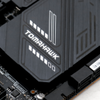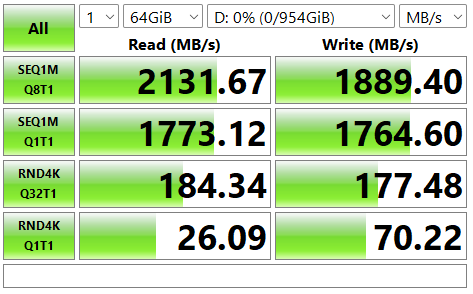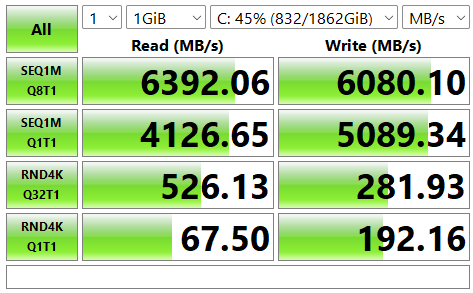Performance - Motherboard - Storage USB 3.2 Gen2 and NVMe M.2
USB performance
Since its 12Mbps beginnings in the 1990s, USB has undergone several revisions. It has moved away from USB-B and is moving away from USB-A in favour of the smaller, reversible USB-C connector. We can now run robust setups with high-resolution monitors, fast external storage, and a plethora of other devices thanks to USB4, the USB Implementers Forum's latest open standard for data transfer. USB4 is the first version to combine the USB and Intel Thunderbolt protocols, making USB more versatile while also further segmenting the technology into distinct performance tiers. USB4 is the most advanced USB version because of improvements like dynamic bandwidth allotment. Even though computers, docks, and cables exist that are compatible with USB4, we have yet to see everything that the protocol is capable.
Given everything that's happening on, we figured now would be a good moment to highlight the newest iteration of USB. We've put together a short USB4 refresher, explaining the fundamentals of the standard, including its important features like protocol tunneling, Alt Mode, and power delivery, and how they compare to previous versions.
| USB Version | Transfer rate | Connector Type |
|---|---|---|
| USB4 | Minimum of 20Gbps, 40Gbps is optional | USB-C |
| USB 3.2 Gen 2x2, aka USB 20Gbps | 20Gbps | USB-C |
| USB 3.2 Gen 2 ,aka USB 10Gbps | 10Gbps | USB-C, USB-A, USB-B, Micro USB-B |
| USB 3.2 Gen 1, aka USB 5Gbps | 5Gbps | USB-C, USB-A, USB-B, Micro USB-B |
| USB 2.0 | 0.48Gbps | USB-C, USB-A, USB-B, Micro USB-B Micro USB-A, Mini USB-B, Mini USB-A |
| USB 1.1 | 0.012Gbps | USB-A, USB-B |
| Thunderbolt 4 | 40Gbps | USB-C |
| Thunderbolt 3 | 40Gbps | USB-C |
We test with a USB 3.2 Gen2x2 (20 Gbps) Flash drive.
As you can see, 20 Gbps kicks in ...
NVMe M.2 SSD Performance
CrystalDiskMark is a disk benchmark utility that measures performance for any storage device's sequential and random reads/writes of various sizes. It is useful for comparing the speed of both portable and local storage devices. CrystalDiskMark can measure sequential reads/writes speed, measure random 512 KB, 4 KB, 4 KB (Queue Depth = 32) reads/writes speed, has support for different types of test data (Random, 0 Fill, 1 Fill), includes basic theme support and has multilingual support. Give it a try yourself as it is free to download. The SSD is showing some very decent results back at us. Just compare read/write performance of the other drives shown.
PCIe 4.0 x4 NVMe SSD



